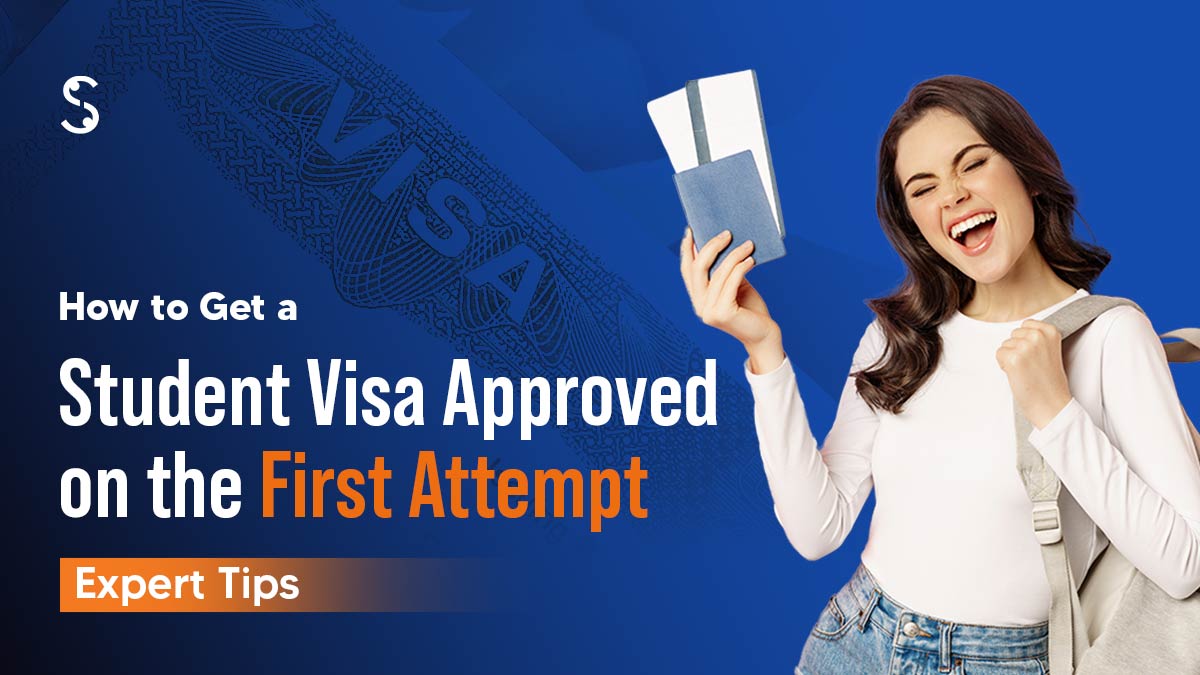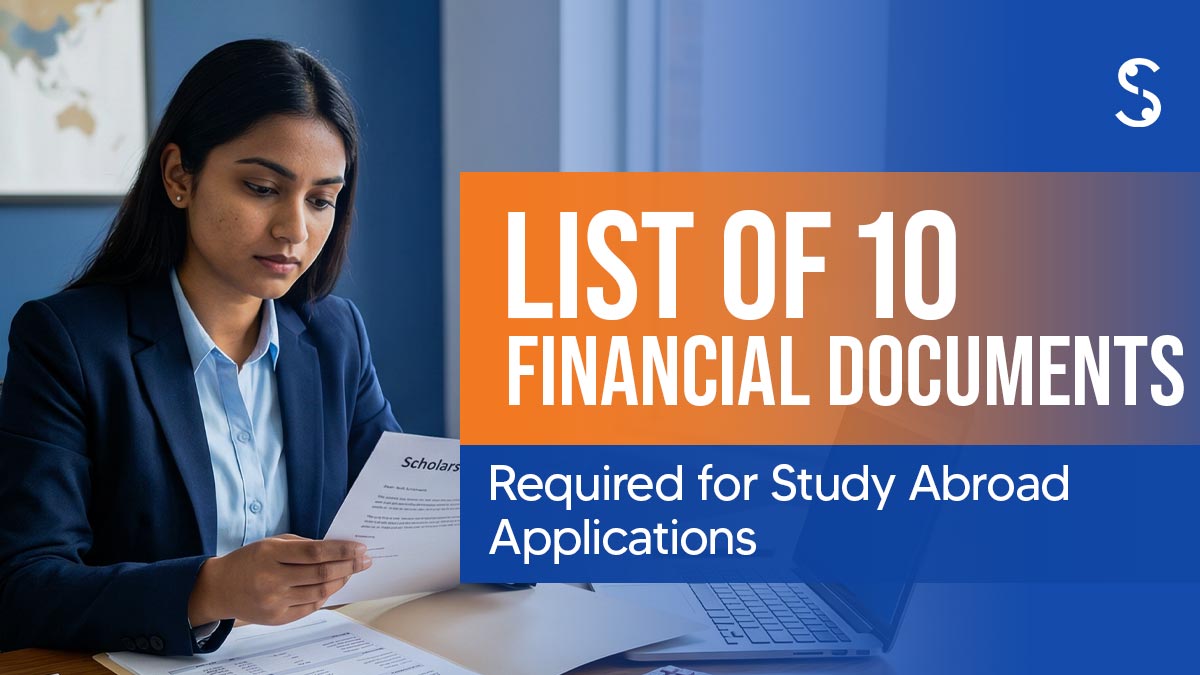
How to Get a Student Visa Approved on the First Attempt
Looking into education overseas marks a significant turning point in any learner’s path. This goal brings feelings, thrills, worry, expectations, and even moments of stress. Picking a school, handling cash matters, and dealing with forms add up fast. Yet everything ties back to a single key move: having your study permit accepted.
The visa process usually stresses students out but get this: Nailing it on your first try is totally possible when you’ve got the proper steps. This walkthrough simplifies every part without fluff, using clear examples and real talk so you’re calm and well set up, because confidence comes from knowing what’s ahead as you move closer to studying abroad.
10 Tips to Get Your Student Visa Approved on the First Attempt
Getting a student visa doesn’t have to be stressful and following the right steps can significantly boost your chances of approval. Below are the steps which will help you get your student visa in the first attempt itself:
1. Start With the Right Research
Figuring out your study plan comes first if you’re after a student visa. Officials check more than paperwork; they care about what you’re aiming for. It’s key to showing why that program matters, why that nation fits, and how it ties into what’s next.
- Pause a bit to look around yet dig deeper. The connection between this class and what you’ve studied before. Linking past studies or jobs to your selected course makes things flow better. Because when it looks like you’ve got a clear path, schools are more likely to say yes.
- Imagine where this course could take you jobwise. Might it boost your skills on the path you want? Could it lead to chances back home or even overseas? When officials see you’ve thought ahead, they’ll trust your intentions more.
- Each nation has its own edge, maybe top-tier tech, standout medical education, solid market experience, or fresh ideas in arts and media. Show why your location fits perfectly with your area. Instead of listing perks, paint a real picture. Use examples people can relate to. Skip the hype and focus on the facts that matter.
- The school’s name carries weight. A solid school that’s properly certified gives your resume more clout. Because it proves you picked up a good program on purpose, instead of just by chance.
Focusing on thorough research like these signals, you’re serious, clear-headed, or dependable, traits that boost your odds of nailing the student visa right away.
2. Get Admission from a Recognised Institution
Your acceptance letter forms the core of your Student Visa request. It’s the initial sign showing you’re genuinely planning to study. Since most nations require enrollment in official, approved schools before granting visas, getting into such programs matters.
- Choosing a reputable university or college: Check if you’re serious about studying. You’re focused on learning; this proves it’s real, not just an excuse for something else.
- Proves authenticity: Familiar schools stick to tight entry rules, so immigration staff see you’re serious about studying.
- Fosters confidence in the person reviewing your application. A trustworthy school boosts your image right away by reducing the risk of sketchy or weak sign-ups.
- Check if the school has official approval. It has got approval from global groups, and it is known worldwide. Rankings matter, as well as the way classes are set up, while campus image plays a role, too.
- Student feedback plus job outcome stats. A good school boosts your visa chances while providing solid training that aligns with what you want to do later.
3. Strengthen Your Financial Documents
Money readiness matters big when applying for a student visa. Consulates need absolute confidence to cover school costs, daily spending, plus everything else overseas, no cash troubles. Solid proof shows you’re set, serious, and able to finish studies without stress.
- Be sure to add: A Fair amount of money in your account; it must match what the nation asks for. Each country sets its own lowest cash limit. See that your stash hits it, or better, tops it.
- Get 6 months of clean bank records: Steer clear of big deposits out of nowhere; visa staff prefer seeing regular income, ongoing savings habits, or signs that your financial situation is stable.
- Income tax returns: ITRs show you or someone backing you have a steady income, plus they highlight how well finances are managed.
- Sponsorship affidavits: If you’re getting help with school, the person backing you needs a legal, plain-spoken sponsor letter, supported by documentation.
- Study loan papers if needed. A greenlit loan boosts your position, proving you’ve got solid support from a known lender.
Your financial papers need to seem steady, transparent, and maybe a bit predictable. A solid setup can boost trust, lower red flags, so you’re more likely to nail the Student Visa for the first time around.
4. Present a Clean and Complete Document File
Some learners don’t realise how vital paperwork is when applying for a student visa. One tiny mistake; like an out-of-date passport, blank section on a form, or no signature. It might slow things down or lead to denial. Carefully putting everything together shows you’re serious, and it helps officials see you in a positive light right away.
- Go through each step carefully: be sure to add everything, like a passport that stays okay throughout the trip. Many nations require your passport to be valid for the duration of your study period, or, say, for up to a year.
- Recent photographs: Stick to the size and backdrop rules the embassy gave, match them exactly.
- College diplomas or class records: Send clean, verified copies of your 10th, 12th, or college papers based on what’s needed.
- Entrance test scores (IELTS, TOEFL, PTE, GMAT, SAT): These marks show you can handle the language plus qualify for your selected class.
- Visa application form: Look over everything again and fix typos, incorrect words, or missing parts before sending it off.
- Lab results, when needed: Countries such as Canada, Australia, and the UK might ask you to get a checkup at approved clinics.
- Travel insurance: Some destinations require mandatory travel insurance before issuing a visa.
Keep your papers sorted, one step at a time, using clear folder labels. Tidy files show you mean business, look sharp, and help the visa agent check things quickly so they can say yes sooner.
5. Craft a Genuine and Impactful Statement of Purpose
Your Statement of Purpose isn’t only paperwork; it speaks to you during the student’s visa journey. Instead of staying silent, let it show who you really are, what drives you forward. Since officer’s review tons of files, you need to focus sharply on why you chose this path. When crafted clearly, it grabs attention right away.
- A strong SOP should: Break down why you picked up this class, and share what matters most to you. Show you get what the program covers, and also why it matters to your school goals or career path. Understanding helps build fundamental skills on top of knowledge already gained through experience.
- Show how these fit with what you studied before. Show how your past studies or work links to what’s coming next. That way, things make sense to immigration reviewers.
- Show what it means for your job down the line. Talk about where you want to end up, what abilities you’d like to pick up along the way, because of this course, or how it might open doors you hadn’t expected before.
- Tell me the reason you picked that nation, along with the school you chose. Show key points like strong teachers, good labs, high ratings, job network links, real-world projects, and international experience.
- Show your plan to go back home once school ends. This part really matters. Because visa staff must see that you intend to return, they use what you’ve learned to help your nation grow.
- Avoid tired phrases, plus don’t use empty words. A genuine SOP, clearly written, boosts your college application while possibly swaying the decision on your student visa. Though not always required, it often plays a key role in officer eligibility reviews.
6. Be Completely Transparent
Visa officials prefer truth over perfect records. They know some students face challenges in school or life. Clarity and confidence matter the most when explaining your case. Past academic breaks, poor scores, pending exams, or earlier visa denials? Speaking up, it helps. Hiding issues hurts more than admitting them calmly.
Show that:
- You’ve gained knowledge through what you’ve been through.
- Describe the reason for the poor result or delay. Show what steps you took afterwards to grow. Use different wordings for each part. Keep it clear. Focus on concrete actions rather than vague terms. Make sure both sections are equally detailed.
- You stay sharp, also driven. Show your current focus on study aims, as well as your readiness to do well in the program you picked.
- Your purpose focuses on learning. Emphasize that your goal is real understanding, rather than moving abroad by taking quick routes.
Hiding or altering details raises serious concerns and may result in an instant denial. Being open fosters confidence, and that confidence greatly increases the chances of visa approval the first time around.
7. Prepare Confidently for the Visa Interview
If your selected country includes an interview, how you do it may significantly affect the outcome. Because it’s your opportunity to show the officer directly that you’re a serious student who knows what they want academically.
- During the interview: Keep cool yet assured. Nervousness happens naturally yet aims to keep calm. Being confident suggests clarity of intent and a lack of secrets.
- Maintain eye contact: It shows honesty, which strengthens confidence during the interview.
- Reply truthfully shortly: Avoid rehearsing or complex replies. Use straightforward, honest language instead. While keeping it clear, focus on clarity over flair. Although simplicity is key, do not oversimplify meaning. Since honesty matters, skip exaggeration entirely.
- Show clear connections to your homeland, such as family ties or future career goals, as well as any property you own.
- Visa officials need to know you’ll return after your education ends. Emphasise strong ties to your country, like family or job prospects, that show reasons to return.
- Show how you thought about the topic step by step. Know your subject, why you picked it, what skills you aim to gain, and how it connects to your future work path.
Keep in mind: interviewers don’t assess your English fluency. They’re evaluating how clearly you speak, whether you’re sincere, and whether you show real purpose. Stay composed as you prepare,and answer truthfully so you pass the student visa interview right away. Instead of rushing, focus on being straightforward; that way, success comes naturally the first time through.
8. Show That You Intend to Return Home
One of the most common reasons for Student Visa rejection is the visa officer’s doubt about whether the applicant will return home after completing their studies. To overcome this, you must clearly communicate that your purpose is education, not permanent settlement.
Strengthen your case by highlighting:
- Family responsibilities: Mention parents, dependents, or commitments that require your presence back home.
- Career plans in your home country: Share your long-term professional goals and how you plan to build your career locally.
- Job opportunities you aim for: Explain how your chosen course will help you secure better roles or promotions when you return.
- How the international degree will help you grow back home: Emphasise how global exposure, specialised skills, and an international qualification will allow you to contribute meaningfully to your industry in your home country.
When you communicate these points clearly, it reassures the visa officer that you respect the rules, understand your responsibilities, and have no intention of misusing the Student Visa.
9. Apply Well Before the Deadline
Timing is crucial in the Student Visa process. Submitting your application early not only shows responsibility but also gives you enough room to handle unexpected delays or additional requirements from the embassy.
Applying early gives you:
- More time to fix errors: Whether it’s a missing document, incorrect form, or unclear financial proof, early submission allows time for corrections.
- Faster processing: Embassies receive thousands of applications. The earlier you apply, the sooner yours get reviewed.
- Better chances to meet embassy requirements: If additional documents or clarifications are requested, you’ll have enough time to gather and submit them.
- Reduced stress: With deadlines far away, you can prepare calmly and avoid last-minute panic.
Late submissions often lead to rushed paperwork, incomplete files, and unnecessary mistakes, all of which increase the chances of rejection. Applying early keeps your process smooth, organised, and stress-free.
10. Seek Guidance From Experts
Yes, you can apply on your own, but student visa rules are constantly changing, and each country has its own, sometimes complicated, process. Even a minor oversight in documents, financial proofs, or form-filling can delay your application or even lead to rejection. That’s why professional support can make a huge difference.
Expert guidance ensures:
- Accurate documentation: Every document is checked, verified, and organised in accordance with embassy standards.
- Strong SOP writing: Experts help you craft a compelling, personalised, and error-free Statement of Purpose that reflects your real intentions.
- Proper financial arrangement: They guide you on fund requirements, bank statements, sponsorships, and loans, ensuring your financial proof is solid.
- Interview preparation: Mock interviews help you practice confidence, clarity, and the right tone for visa officers.
- Error-free application: With professionals reviewing every detail, the risk of errors is significantly reduced.
With experienced support, the entire visa process becomes smoother, faster, and far more accurate, significantly increasing your chances of first-attempt Student Visa approval.
Get your Student Visa with Shuraa Education!
Getting your Student Visa approved on the first attempt is absolutely possible when you prepare smartly and follow the proper steps. Your dream of studying abroad deserves expert care, and that’s where Shuraa Education steps in.
From course selection and documentation to visa filing and interview training, we ensure a smooth, stress-free journey for every student.
Contact Shuraa Education today! Call us at +91 9319998925 or drop a mail.
edusagar@shuraaeducation.com. Your global career starts with the right guidance. Let’s build it together.
Let's Plan Your Study Abroad Journey!
Please leave your details and we will contact you shortly!
Categories
Trending Post
Latest Post

How to Study Abroad for Free or Cheap in 2026?
Many students believe that studying abroad is only for people with a lot of money. The high fees, expensive lifestyle, and foreign currencies can make it feel scary and impossible. Because of this, many students drop the idea without even checking what options are actually available. But the truth is – Studying abroad is much more […]
Read More
UCD Dublin Rankings, Fees, Courses & Reviews for Indian
For Indian students planning to study in Dublin, University College Dublin (UCD) stands out as a top choice for quality education and global exposure. As Ireland’s most globally connected university, UCD attracts students from around the world through its strong focus on research, innovation, and real-world impact. The campus culture is spirited and inclusive, making […]
Read More
List of 10 Financial Documents Required for Study Abroad Applications
Planning to study abroad is exciting, but before you pack your bags, there’s one critical step you can’t skip: proving your financial readiness. Universities and immigration authorities want assurance that you can comfortably cover tuition fees, living expenses, and other costs throughout your studies. That’s where the financial documents required for study abroad come in. These documents form the backbone of your […]
Read More
